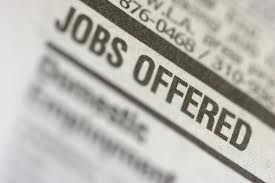
The number of Scots in work has risen.
Over 2.5m are employed - that is up by 40,000 over the last year. The unemployment figure is down by 15,000 thousand over the last quarter, and by 39,000 over the year, but still stands at 152,000 for the whole of Scotland.
Employment in Fife is highest in Cowdenbeath, and lowest in Mid Fife and Glenrothes.
The headline figures are:
- 152,000 people are unemployed in Scotland
- 12,000 are out of work across Fife
- The Scottish unemployment rate is 5.5%, below the 5.6% rate for the whole of the UK
- There are 2,616,000 people employed in Scotland, including 174,000 in Fife
- 5,959 Fifers are claiming Jobseeker's Allowance, down by 1,369 on last year
- Across Scotland, 74,600 people are claiming JSA, 21,700 less than last year
- Mid Fife and Glenrothes has the highest rate of unemployment in Fife, at nearly 11-percent
- North East Fife has the lowest rate, at 4%
Euan Halliday from the Jobcentre told Kingdom FM News how unemployment is looking in Fife:
Minister for Youth and Women’s Employment, Annabelle Ewing, said:
"These figures show a growing economy and falling unemployment – both extremely encouraging indicators and signs that the economic picture in Scotland is continuing to improve. Indeed, Scotland was the only country of the UK where unemployment actually fell over the quarter. Youth employment is one of our highest priorities and we will continue to work with employers and all other interested parties to ensure more of our young men and women get in to work and stay in work. These statistics are not just good news for employment but our economy across the board – especially our construction sector."
The Secretary of State for Scotland David Mundell said:
"Today’s employment figures confirm the decisions we are taking is creating a better, more prosperous future for the whole of the country. The latest figures on economic activity, also released today, show Scotland’s economy is growing in line with the UK. With businesses creating jobs, living standards rising strongly and the UK’s economy growing faster than any other major advanced country, this shows our long-term economic plan is working. Last week’s Budget rewards work, backs aspiration, ensures fairness to taxpayers and gives businesses confidence to invest, to grow and to hire in the months and years ahead. The National Living Wage is an essential part of our move to a higher wage, lower tax, lower welfare society. Rising to over £9 an hour by 2020, this will outstrip the First Minister's own ambition to have a national minimum wage of £8.70 an hour by 2020.
"This is a Government working to ensure every part of the country benefits from a growing economy whilst also ensuring future generations are not burdened by a debt run up by previous governments in this generation. We have a job to do and we’re here to get on with it."


 Man, 44, seriously injured in hospital after crash between Comrie and Rosyth
Man, 44, seriously injured in hospital after crash between Comrie and Rosyth
 John Swinney announces SNP leadership bid
John Swinney announces SNP leadership bid
 Closures on A92 from TONIGHT for roadworks
Closures on A92 from TONIGHT for roadworks
 16°C
16°C
 13°C
13°C